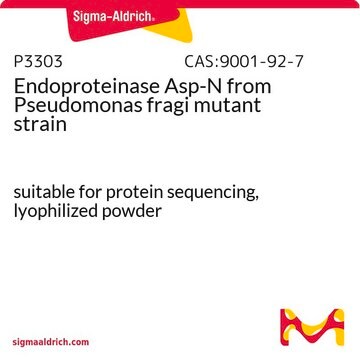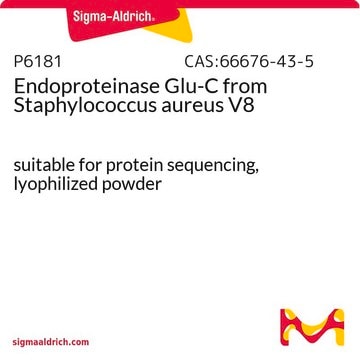Kluczowe dokumenty
ENDOLYSS-RO
Roche
Endoproteinase Lys-C Sequencing Grade
from Lysobacter enzymogenes
Synonim(y):
lys-c, lysyl endopeptidase, protease
Wybierz wielkość
1130,00 zł
Przewidywany termin wysyłki22 kwietnia 2025Szczegóły
Wybierz wielkość
About This Item
1130,00 zł
Przewidywany termin wysyłki22 kwietnia 2025Szczegóły
Polecane produkty
pochodzenie biologiczne
bacterial (Lysobacter enzymogenes)
Formularz
lyophilized
aktywność właściwa
≥200 units/mg protein (at 25 °C, with Chromozym PL)
masa cząsteczkowa
33 kDa by SDS-PAGE (reducing)
oczyszczone przez
electrophoresis
opakowanie
pkg of 3 × 5 μg (11047825001)
pkg of 5 μg (11420429001)
producent / nazwa handlowa
Roche
warunki przechowywania
(Keep container tightly closed in a dry and well-ventilated place.)
metody
activity assay: suitable
kolor
white
optymalne pH
8.5-8.8
zakres pH
5-12
rozpuszczalność
water: soluble
przydatność
suitable for enzyme test
numer dostępu UniProt
temp. przechowywania
2-8°C
Powiązane kategorie
Opis ogólny
Specyficzność
Heat inactivation: Enzyme can be denatured using heat (5 min at 100 °C) or by TCA.
Zastosowanie
Uwaga dotycząca przygotowania
Rekonstytucja
Stable in 4 M urea.
Inne uwagi
Kod klasy składowania
11 - Combustible Solids
Klasa zagrożenia wodnego (WGK)
WGK 2
Temperatura zapłonu (°F)
does not flash
Temperatura zapłonu (°C)
does not flash
Wybierz jedną z najnowszych wersji:
Masz już ten produkt?
Dokumenty związane z niedawno zakupionymi produktami zostały zamieszczone w Bibliotece dokumentów.
Nasz zespół naukowców ma doświadczenie we wszystkich obszarach badań, w tym w naukach przyrodniczych, materiałoznawstwie, syntezie chemicznej, chromatografii, analityce i wielu innych dziedzinach.
Skontaktuj się z zespołem ds. pomocy technicznej





